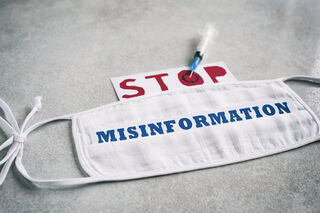Anxiety
Why Is Misinformation So Appealing?
What we know about misinformation in times of crisis.
Posted August 7, 2020 Reviewed by Devon Frye
It is a common experience to find things on the internet we might not have been expecting. For me, a catnip toy in the shape of Putin that I discovered in the winter of 2017 was certainly a highlight.
But some discoveries are not nearly so pleasant. Lately, in the context of the coronavirus pandemic, there have been many of these not-so-pleasant internet discoveries. Among them were the short film “Plandemic,” a viral video that claimed, among other things, that masks activate the virus and that the coronavirus vaccine will kill millions of people. Then there is the ever-circulating conspiracy theory that Bill Gates created coronavirus so that he could use a vaccine to insert microchips in large portions of the American population that he would use to track people.
While all of these claims are probably more widespread than they should be, there are also a series of other pieces of misinformation about the novel illness that are less extreme. For example, many people still believe that masks are ineffective against the virus and that children are unable to become ill from it. It is understandable why people would believe these misinformed tidbits, especially given statements made by usually reliable sources earlier in the pandemic.
No matter how you look at it, misinformation and conspiracy theories are spreading at alarming rates. This has led the World Health Organization (WHO) to declare an “infodemic.” And indeed, a recent survey of US residents found that 23 percent believed that the virus was created intentionally (only 6 percent subscribed to the belief that it was created accidentally in a laboratory). With misinformation already on the rise and views about coronavirus becoming increasingly politicized, throwing a national election into the mix will likely only exacerbate things, accelerating politicization of false claims about the illness and making it more tempting to believe whatever best aligns with our increasingly passionate political views.
While most of us probably have not seriously engaged with conspiracy theories such as the one about Bill Gates, many, many people are falling victim to false information about the transmission and treatment of the illness that turn out to be extremely dangerous—like believing that silver can cure the illness or that dark skin protects people from becoming infected.

So why is misinformation so appealing during times of crisis? Well, there are at least a few relatively simple explanations. One is that people are abnormally anxious during times of crisis. This is understandably the case. People who suffer from anxiety disorders will tell you that when you are extremely anxious, the desperate search for reassurance can lead you down some strange paths.
This is what is behind the dreaded “internet rabbit hole,” in which a panicked state of mind might lead you to conclude something bizarre based on how your anxiety is guiding your internet search. A lot of this has to do with the fact that the reasoning parts of your brain do not work quite as well when you’re highly anxious so you aren’t able to evaluate information as clearly.
There is also the related issue of distraction. The more distracted we are, the more likely we are to believe false claims. Having a lot of anxiety is like living in a constant state of distraction—it is as though there is a thin veil over everything we see and we can only barely make out what it is.
But this can’t be the whole story, especially with claims that are especially unbelievable, like the idea that saltwater cures coronavirus. This is where we need to understand that people are not only having increased difficulty processing information but they also have a desire to believe something, anything. In order for misinformation to truly work its magic, there has to be a willingness on the part of the recipient (or victim) of misinformation to believe it.
You might be thinking: Why would we want to believe things that aren’t true? Well, extreme circumstances will create an opportunity for us to want this. In the case of something like the coronavirus pandemic, we have few definitive answers to our questions. Why did this happen? How do we stop it? How long will it take to stop it? We do have some answers to these questions but nothing is absolute in such a continuously evolving situation. Human beings are so uncomfortable sitting with this gap in knowledge that they would rather fabricate truth than just live with not knowing.
This is not to say we do this with everything. If there’s a topic I don’t know about, like how to fix a washing machine, but it doesn’t matter that much to me that I don’t know about it, then I am happy to just say “I don’t know.” But if the topic is somehow particularly salient and important and I’m not getting the answers I want from mainstream or typical sources, I will start to perform that panicked late-night internet search that leads me to strange, but oddly passable, explanations.
Given this surge of misinformation, is there anything we can do to lead people to the correct information? It is certainly more complex than simply providing corrective information, but there is a whole literature suggesting various methods to fight misinformation. Here are a few highlights:
- Beware the continued influence effect. The continued influence effect refers to a phenomenon in which people hold on to debunked information even after it has been corrected. It is posited that this happens because people build a mental model explaining a particular series of events and it is difficult to disrupt this once it has been formulated. There are a few techniques that have been shown to help overcome this. One is to provide alternative explanations, rather than simply debunking information and saying it is wrong. This helps people build a new mental model. Another potentially effective technique is to warn people about the continued influence effect before you debunk the misinformation. In some cases, this awareness helps people engage more actively in displacing the debunked information.
- Use both topic and technique rebuttal. Just as vaccines work by exposing people to small amounts of inactivated virus in order to mount an immune response, it is thought to be the case that a similar type of “inoculation” might work to debunk misinformation. That is, warning people that you are about to debunk incorrect information (topic rebuttal) or that you are about to question the methods by which that incorrect information was created (technique rebuttal) may be more effective in persuading people to believe the correct information than simply providing the corrective information on its own.
- Use motivational interviewing techniques. The jury is still mostly out on this technique as a tool to counteract misinformation, but there is reason to believe that engaging people in an empathic dialogue about how they arrived at their views might help them be more open to hearing other sides of the story. This technique requires time and patience, as it may not be effective over the course of a single encounter.
The spread of misinformation surrounding COVID-19 is alarming and dire, but it is also understandable given high levels of stress and uncertainty. All we can do is continue to test new methods of debunking misinformation and continue to suggest techniques for managing anxiety in this highly unusual time.




